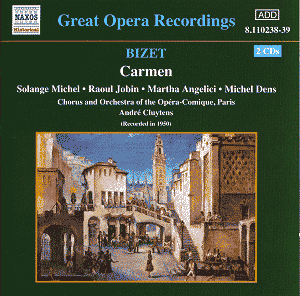|
| Our Summer 2014 Friday Blog and Podcasts reach into past musings. Today's post is a repeat of a Tuesday Blog from September 6, 2011. Some of the post's content and illustrations were changed to fit this month's thematic arc. |
This month's "do-over" posts feature Canadian Content: artists and composers. Today's look at Bizet's Carmen affords us the opportunity to put the spotlight on a great Canadian lyric tenor, who walked the operatic stages of the World between 1930 and 1960.
Carmen is not my favourite opera: to me, opera is a display of raw emotion, and it requires (more often than not) that one's own emotions bubble to the surface. Speaking for myself, I don't find the character of Carmen very sympathetic, and you figure she gets what she asked for at the end (harsh as it may seem). Other French operas: Poulenc's Dialogues des Carmélites, or even Gounod's Faust manage to get the waterworks going for me, and are therefore higher in my list of favourites.
This does not mean that I dislike Carmen - quite the contrary. It has great moments, but it simply isn't "Grand Opera".
My favourite recording:

There's a reason why this is my favourite: it puts Carmen where it belongs: on the stage of the Opera Comique, making it closer to a musical than an opera. The performance isn't "over done", the libretto and book are spoken clearly, so you can follow the action (something I appreaciate as a fluent speaker of the language).
As far as I know, there are two recordings of Quebec-born tenor Raoul Jobin singing Don Jose: one at the MET (under WIlfrid Pelletier, 1946) and this one from the stage of Paris' Opera Comique under Cluytens. It is singing this role that Jobin made his debut in San Francisco, New-Yor k and at the Teatro Colon in Buenos Aires. The "Flower Aria" is his signature aria, and it is his intensity and lyricism that made him the dominant Don Jose of his era:
According to the Canadian Encyclopedia, Raoul Jobin (1906-1974) came from the working-class Quebec City district of St-Sauveur, where his father owned a tavern, and was a member of the parish choir and a soloist there for about 10 years. He first took voice lessons from Louis Gravel and then studied 1924-8 with Émile Larochelle at Laval University. He then went to Paris, where he continued his studies with Mme d'Estainville-Rousset (singing) and Abby Chéreau (stage skills), and at the Institut grégorien de Paris. His exceptional voice captured the attention of Henri Büsser who arranged his audition for Jacques Rouché, the director of the Paris Opéra, who in turn offered him a contract for the following year.
Maintaining a busy career in Europe, he was forced to return to North AMerica at the onset of World War II. At WIkfrid Pelletier's urging, he entered the 'Metropolitan Opera Auditions of the Air,' and the Metropolitan placed him under contract immediately, making his debut there in 1940. He remained with this company until 1950, singing many roles alongside such stars as Lily Pons, Bidú Sayão, Martial Singher, Ezio Pinza, Salvatore Baccaloni, Rïse Stevens, and Licia Albanese, under the direction of such conductors as Thomas Beecham and Wilfrid Pelletier.
Although rightly considered the successor to Georges Thill as the greatest 'French' tenor of his time, Jobin was unable to escape specialization. Yet it was the really substantial roles - whether French (Hoffmann, Samson, and especially Don José), Italian (Cavaradossi, Canio), or German (Lohengrin) - that best lent themselves to the heroic nature of his powerful voice with its triumphant highs, to his dramatic instinct, and to his temperament. Upon his death the French critic Jean Goury said of him: 'Raoul Jobin was undoubtedly one of the most celebrated tenors in the French tradition in recent decades. His voice, with its highly personalized timbre - neither Italianized nor Nordic but permeated with the warm fragrance of the Canadian soil - was capable of surprising variations in dynamics ... Raoul Jobin was a singer in the grand tradition, never sacrificing musicianship to sentiment and maintaining at all times a restraint of the highest order'.
I think you will love this music too!
DETAILS
Georges BIZET (1838-1875)
Carmen - opéra-comique in four acts (1875)
French libretto by Henri Meilhac and Ludovic Halévy after the novella Carmen, by Prosper Mérimée.
PRINCIPAL CAST
Carmen - Solange Michel
Don José - Raoul Jobin
Escamillo - Michel Dens
Choeurs de l'Opéra-Comique, Henri Janin (Chorus master)
Orchestre de l'Opéra-Comique, André Cluytens conducting
Recrding date: 6-9 September 1950
Synopsis: http://classicalmusic.about.com/od/opera/qt/carmensynopsis.htm
Libretto: http://www.murashev.com/opera/Carmen_libretto_French_English

No comments:
Post a Comment